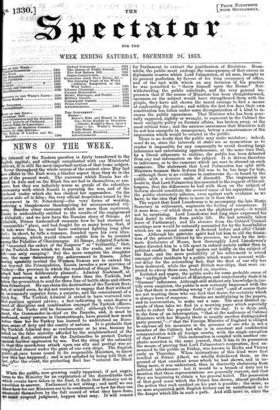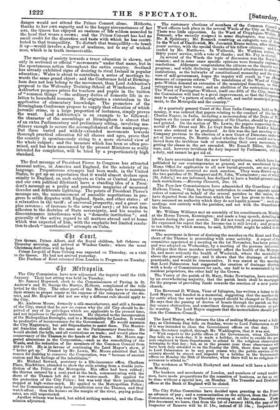When the public, now growing really impatient, if not angry,
urns to the Ministry for an explanation of the discreditable turn vluch events have taken in the East, it finds that Ministry not in Tosition to answer. Parliament is not sitting ; and until we can mow how far our Ministers are to be condemned, or how far ther can ionerate themselves by the full record of what they have done, " mast suspend judgment, happen what may. It will remain
for Parliament to extract the justification of Ministers. Mean- while, the public must undergo the consequences of that excess in diplomatic reserve which Lord Palmerston, of 'all men, brought to its present perfection by favour of his long occupancy of office, and of the tact with which on any invasion of his practice he was permitted to " throw himself upon the House." Not- withstanding the public solicitude, and the very general im- pression that if the course of Ministers has been straightforward; openness on the subject would have strengthened them with the people, they have not shown the moral courage to find a means of confronting the nation; and within the last few days their own constitution has fallen under some disorganization of a kind to in- crease the public uneasiness. That Minister who has been gene- rally supposed, rightly or wrongly, to represent in the Cabinet the most energetic policy on Eastern affairs, has broken away, at the most critical time ; and the anxious assurances that Ministers will be not less energetic in consequence, betray a consciousness of the impression which would be created in the public.
There is no doubt that the public may make mistakes ; indeed, must do so, since the interests at stake are so momentous as to render it impossible for any community to avoid drawing large inferences and entertaining apprehensions, at the same time that, by a literal adherence to routine, the public has been debarred from any real information on the subject. It is driven therefore to inferences, or to the rumours which are sure to abound on such occasions. The statement that Lord Palmerston has split with Ministers because their Reform Bill was to be too -large for him, —although there is no evidence to contravene it,—is heard by the. public with a derisive smile of discredit. The impression no doubt is, that Lord Palmerston has assented to thi request of his col- leagues, that the differences he had with them on the subject of Reform should constitute the avowed cause of his separation ; but the public obstinately adheres, even against such evidence as we have, to the idea that there is more in it than that. ..
The report that Lord Lansdowne is to accompany the late Houle. 'Secretary in retirement, augments the feeling of uneasiness. If
it were true,—of which there is not the slightest proof,—it would, not be surprising. Lord Lansdowne had long since expressed his' final desire to retire from public life. Be had actually taken leave of Parliament; and his absence from the Cabinet Council meetings now would be naturally accounted for by the hospitalities which are an annual custom at BOWOOd before and after Christ- mas. Although his patriotic spirit had led him to "aid the, forma- tion of the present Cabinet by his presence, we learn by the inti- mate disclosures of Moore, how thoroughly Lord Lansdowne's tastes directed him to a life spent in refined society rather than in political conflict. But he had spoken out boldly on the subject of the East, and the mere probability of his retirement is seized amongst other incidents by a public which wants to account with- out delay for the astounding fact, that the fleet of our ally has been destroyed, while the great British war-ships, that were ex- pected to sweep those, seas, looked on, inactive. Irritated and angry, the public seeks for some probable cause of the " unEnglisb. " conduct of Ministers; and conjecturally finds it in "German" influences. Although still without any knowledge to jus- tify even suspicion, the public is now seriousliy impressed with the. fear that there is something wrong " at Court ; and of course there are not wanting those who can feed that desire for certainty which is always born of suspense. Stories are multiplying in the papers, and in conversation, to make out a case. The most distinct ex- ample of these tales we find in a morning paper which especially seeks to reflect the popular feeling of the day. It is there said, in the form of an interrogation, " that at the audiences of Cabinet Ministers with her Majesty there is usually another distinguished party present,"—" that the Foreign Minister of England is obliged to canvass all his measures in the presence of one who is not a member of the Cabinet, but who is in constant and confidential communication with all foreign courts, with the single exception of that of France." This insinuation is coupled with another em- phatic assertion in the same journal, that it has in its possession the means of proving that Lord Palmerston's resignation, first an- nounced to the public on Friday, was known in Berlin and Vienna early on Thursday. When insinuations of this kind were first levelled at Prince Albert, we wholly disbelieved them, on the ground of that excellent sense which he had shown, and in no- thing more, it was understood, than in discreetly abstaining from political interference : but it would be a breach of duty not to mention that these representations are generally current, and that they are beginning to obtain a too general belief. The possession of that good sense which the Prince has shown, almost precludes the notion that such conduct on his part is possible ; the more, as no man acquainted:30th English history can be uninformed as to the danger which lihs in such a path. And still more so, since the danger would not attend the Prince Consort alone. Hitherto, thanks to her own sagacity and to the happy circumstances of her sera, the Queen has enjoyed an easiness of life seldom accorded to the head that wears a crown ; and the Prinos Consort has had no small credit for the discretion and taste with which he has contri- buted to that tranquillity. To disturb that tranquillity—to break it up—would involve a degree of madness, not to say of wicked- ness, which is in truth inconceivable.



































 Previous page
Previous page